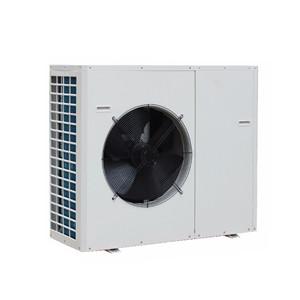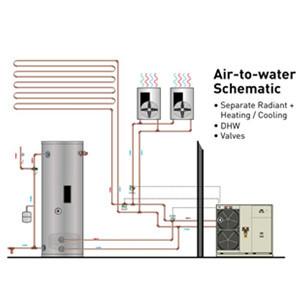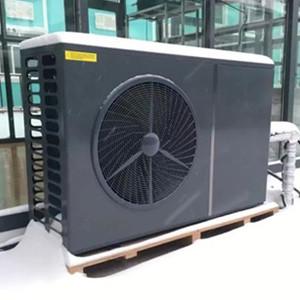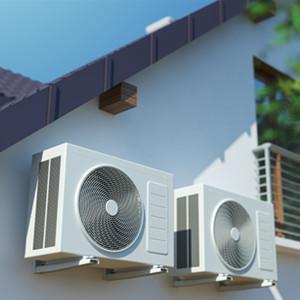Air Source Heat Pump Advice
What is an air source heat pump?An air source heat pump (ASHP) works by transferring heat absorbed from the outside air to an indoor space. This heats the radiators and provides domestic hot water via a wet central heating system. Heat pumps work like refrigerators: they absorb heat and transfer it to another medium.
Some air source heat pumps can also be used as cooling systems in summer. The most common is to place them outside a building with enough space for installation.
There are two main types of air source heat pumps:
1. An air-to-air heat pump, which takes heat from the outside air and sends it directly into your home through a fan system to heat the room.
2. Air-to-water heat pumps, which take heat from outside air and transfer it through your central heating system to provide hot water heating, radiators, or underfloor heating in indoor spaces (or all three).
How does an air source heat pump work?
If you're wondering how a heat pump works, it's first important to note that an air source heat pump works very differently than a boiler. An air source heat pump does not generate heat - it just moves heat from one place to another through the vapor compression cycle (or refrigeration process) to make it more useful.
The heat from the air is absorbed into the fluid, causing it to "boil" and turn into a gas. The gas is then compressed, increasing its temperature. The higher temperature is then transferred to the heating system (i.e. radiators or underfloor heating).
Do Air Source Heat Pumps Need Electricity?
Yes, just like ground source heat pumps, air source heat pumps require electricity.
Efficiency, or a measure of thermal energy output per kilowatt of electricity, expressed as COP (Coefficient of Performance) or SCOP (or Seasonal Coefficient of Performance - SCOP is the average COP over a defined period of time, such as a year).
For example, a SCOP of 3.2 means that every 1kW of electricity produces 3.2kW of heat.
However, it is possible to generate electricity from solar photovoltaics (along with batteries for storage), which means that off-grid air source heat pumps can be used.

What are the advantages of air source heat pumps?
Properly designing and specifying a system is critical, and ideally, the property's insulation, air tightness and emitters (usually underfloor heating or well-designed radiators) should be optimized to allow you to get the most out of your air source heat pump.
There are many benefits to installing an air source heat pump, including:
1. Unlike gas boilers, air source heat pumps do not generate carbon when operating. While they do use electricity, ASHP can be combined with solar photovoltaic panels or renewable/green energy tariffs on clean electricity.
2. Air-source heat pumps are relatively inexpensive to operate under the right circumstances, especially compared to off-grid fuels such as propane, petroleum, or direct electric heating.
3. Compared to above ground oil tanks or LPG tanks, the outdoor unit takes up less space.
4. Air source heat pumps work well with underfloor heating.
5. There are grants available to offset the cost of installing an air source heat pump, such as the boiler upgrade program.
6. Some models can also be used to cool your home, but you need to weigh heat pumps vs. air conditioners before choosing this solution.
What are the disadvantages of air source heat pumps?
While there are many benefits, there are also some disadvantages, including:
1. They are not a "one size fits all" solution and may not be as suitable for every home as gas boilers. They pair perfectly with well-insulated, airtight homes.
2. Installing an air source heat pump in an existing house is more complicated, and replacing a gas boiler will inevitably be much more expensive than a comparable replacement.
3. Air source heat pumps still require electricity, so they are not fully “renewable” unless paired with photovoltaic panels or renewable energy tariffs.
4. The current electricity price is very high. Campaigners are demanding that the government remove environmental taxes from electricity bills and focus on air-source heat pumps to ensure that running heat pumps is always cheaper than gas-fired boilers.
5. The greater the difference between the outdoor air and the target temperature (indoor room temperature or domestic hot water), the lower the efficiency.
6. A separate solution may be required to supply hot water to the home.
7. Some models may be noisy. Air source heat pumps can be as noisy as 40 to 60 decibels, but this depends on the manufacturer and installation, and the company certifies the quietest heat pumps.
Is an air source heat pump right for my property?
Here are a few things to consider when looking for an air source heat pump system for your property:
1. Do you have outside space to install the heat pump?
Apartments often have air source heat pumps installed on structurally supported balconies or exterior walls, if allowed - it's best to consult a reputable installer to see if this is right for you.
2. Is your home well insulated?
Sustainable production of heating and hot water is only beneficial if you increase the efficiency of your home. Every property is unique, but it's important to understand what other things you can do to reduce heat loss in your home. Looking at attic insulation and whether you have double-glazed windows would be a good start, but consult a professional for further guidance on what's possible for your home
3. Are you replacing your heating system, or are you building a new home, is this the first heating system to be installed?
Replacing an aging heating system will bring quicker benefits due to increased efficiency. However, for new builds, it's worth talking to your installer about how your heat pump system will work throughout your home - this includes the choice of underfloor heating or radiators, and the appropriate controls to operate it
Are Air Source Heat Pumps Worth It?
The efficiency of an air source heat pump depends on many factors, including the fabric of your home. Equipping your home with an air source heat pump is definitely worth considering in new construction, especially one built with fabric-first principles at the forefront. Not only do they provide low-carbon heating for your home, they are more reliable and last longer than gas boilers.
Air source heat pumps don't go wrong very often, and good quality air source heat pumps can last up to 20 years.
Combine that with the potential to regain some of your initial bill through a boiler upgrade program, and it's a worthwhile investment in your home's future.
How much does an air source heat pump cost?
The cost of installing an air source heat pump will depend on factors such as the complexity of the installation and the distance from the heat pump unit.
While it is difficult to estimate fully installed air source heat pump costs for these reasons, this basic formula provides a best guess calculation:
Use £6,000 as the base cost.
Add £750 per kilowatt to the price (or £1000 per kilowatt for some high-end European heat pumps.)
For example, a 10kW heat pump would cost £6,000 plus £7,500 (10kW x £750) for a total installation cost of £13,500.
However, installation costs in existing homes will be higher for the reasons mentioned above.
How much does an air source heat pump cost to run?
The current cost of a unit of electricity is 28p per kWh, and the average efficiency of an air source heat pump is about 220 to 320 percent.
On a property with an annual heat load of 15,000 kWh, you would expect to use between 4,700 kWh and 6,850 kWh of electricity, which translates to an annual running cost of between £1,320 and £1,920.
How long does it take to install an air source heat pump?
Air source heat pump installation is a relatively low-disruption process that can be completed in just one day.
A solid foundation should be built for the air source heat pump, and when remodeling, all changes to the structure of the house and the radiator system should be done before the installation date.
Air source heat pumps should be installed and commissioned by an accredited Micro Generation Certification Scheme (MCS) installer. A wrongly tuned air source heat pump may consume more power.
Do air source heat pumps require a lot of maintenance?
No, although annual inspections by a qualified engineer are recommended. Much of the homeowner's maintenance is a visual inspection -- checking that the outdoor unit is free of leaves and debris and that the pipes are intact.
Notably, some manufacturers have developed controls that can be monitored and maintained remotely. In the event of a failure, the system can be inspected, the failure diagnosed and the correct spare parts purchased before incurring the cost of a trip to the field.
Engineering accessibility is often an aftermarket add-on, so check costs and requirements before installing an air source heat pump.
In the absence of full remote control and monitoring, it's worth finding a controller that at least stores operational data on a memory card so that it can be accessed for analysis, and perhaps email new settings and updates to you for upload.
What are the renewable alternatives to air source heat pumps?
If you're looking for an alternative to a gas boiler but don't think an air source heat pump is right for your home, there are many other systems you can look into, including:
1. Ground source heat pump.
2. Produce hot water and heating with biomass boilers.
3. Solar thermal panels can also produce hot water, but depending on the weather, make it less reliable during the winter months when it is most needed.
4. Hydrogen heating is also currently being tested as a potential replacement for gas boilers.
Interested in installing an air source heat pump in your home?
Contact us and we'll give you a free no-obligation quote. We will recommend the perfect solution for your heating and hot water needs.





